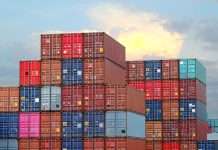
A delegation of California business and state agencies led by Lieutenant Governor Ambassador Eleni Kounalakis traveled to Mexico City for a trade mission to advance business, collaboration and partnership between California and Mexico.
The trade mission, held October 1–4, 2019, was the first international mission of the Newsom administration, and brought together 20 private sector leaders from the agriculture, energy, and clean-technology sectors, as well as approximately 20 representatives from an array of state agencies.
The Governor’s Office of Business and Economic Develpment (Go-Biz) helped organize and lead the mission. A special thanks to IEnova, Sempra Energy, University of California, Visit California, Wine Institute and the California Chamber of Commerce.
The CalChamber and the California Foundation for Commerce and Education (CFCE) assisted in the behind-the-scenes organization of the mission trip. The CalChamber was represented on the delegation by Susanne Stirling, vice president of International Affairs, as well as two CalChamber Board members: Stuart Woolf, president and CEO of Woolf Farming and Processing; and Jennifer Haley, president of Kern Energy.
The objectives of the trade mission were to:
- Reaffirm and strengthen California’s friendship and commercial relationship with Mexico, and to lay the foundation for the Newsom administration’s ongoing and robust engagement in the future;
- Open California’s Trade and Service Desk in Mexico City;
- Engage in dialogue among government officials and the private sector on topics and solutions important to both Mexico and California in the areas of energy, climate, agriculture, water, sustainability, migration and resiliency.
Trade Delegation Blog Summaries
Below are excerpts from Stirling’s blog on the trade delegation activities. For more information or to read the blog in its entirety, visit: https://advocacy.calchamber.com/2019-mexico-trade-mission/.
Day 1: October 1, Arrival and Reception
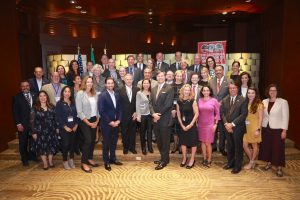
Early this morning the delegation departed California for the financial and political center of Mexico: Mexico City. The 600-year-old city is the oldest capital city in the Americas and is one of the most populated cities in the world.
Our delegation stayed at the JW Marriott Hotel in the Polanco district of Mexico City, which is situated across from Chapultepec Park, one of the largest public parks in the world. This area has been inhabited since pre-Hispanic times and was once a retreat for Aztec rulers. The park in many ways is considered not just a green space, but a historic site as well.
This evening we had a Welcome Reception with the U.S. Ambassador to Mexico, Christopher Landau. Ambassador Landau recently arrived in Mexico himself, having assumed office two months earlier. He was sworn in as United States Ambassador to Mexico on August 12, 2019.
At the welcome reception Ambassador Landau spoke about the U.S. and Mexico bilateral relationship in positive terms. The Ambassador indicated this was his first visit from a state delegation. The Ambassador was accompanied by:
- Minister Counsellor for Commercial Affairs, Brian Brisson;
- Minister Counsellor for Agricultural Affairs, Melinda Sallyards;
- Minister Counsellor for Political Affairs, Dana Brown;
- Counsellor for Economic Affairs, Kevin Murakami;
- Homeland Security Attache Edgar Ramirez; and
- Commercial Officer Paul Oliva, originally from Sacramento.
Day 2: October 2, UC Casa California Conference
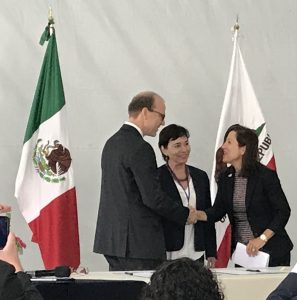 We were up bright and early to head to Casa California for an all-day conference. La Casa de la Universidad de California en México, or Casa California for short, seeks to be an example of academic and intellectual commitment to the promotion and exchange of ideas and knowledge between the diverse campuses of the University of California System and Mexico, and to initiatives that can translate this expertise into practical solutions for the benefit of both societies.
We were up bright and early to head to Casa California for an all-day conference. La Casa de la Universidad de California en México, or Casa California for short, seeks to be an example of academic and intellectual commitment to the promotion and exchange of ideas and knowledge between the diverse campuses of the University of California System and Mexico, and to initiatives that can translate this expertise into practical solutions for the benefit of both societies.
The delegation attended the first day of a conference entitled: México and California: Building Environmental Resilience Together. For the welcome remarks — in Spanish — to the conference, we heard from the Honorable John A. Pérez, Chairman of the UC Board of Regents and Speaker Emeritus of the California State Assembly.
Next, Mexico Undersecretary of Foreign Affairs Jesús Seade welcomed the audience of 175, gave trade statistics and indicated the Mexican government’s support for the U.S.-Mexico-Canada Trade Agreement, which has been ratified in Mexico.
Lt. Governor Eleni Kounalakis spoke and stated she was very pleased to lead the first international delegation of the Newsom administration. The Lt. Governor then announced the creation of the California Trade and Services Desk in Mexico. Carlos Valderrama will be the GO-Biz representative to the Americas. Additionally, GO-Biz will announce the creation of a European and Asian representative at a later date.
The plenary session began next on the topic of “Achieving Environmental Goals in an Unpredictable Climate.” The panel featured Kate Gordon, Director of the Governor’s Office of Planning and Research; Marina Robles, Secretary of the Environment for Mexico City; Andrew McAllister, Commissioner of the California Energy Commission; and Antonio del Rio, Director of the Institute of Renewable Energy (UNAM) in Mexico. The panel was moderated by Stefano Bertozzi, Dean Emeritus of the School of Public Health at UC Berkeley and Director of the UC Mexico Programs.
Following the session, there was a signing of a memorandum of understanding (MOU) between the California Energy Commission and Mexico City. Lt. Governor Eleni Kounalakis took part in the signing along with California Energy Commissioner Andrew McAllister, and Marina Robles, Secretary of the Environment for Mexico City.
After the MOU signing, the delegation had the opportunity to do a little networking before going into breakout sessions on a variety of environmental topics. The session on “Achieving a Sustainable Clean Energy Future for Mexico and California” was a discussion with Michael McNeil, Leader of the Mexico Energy Initiative of Lawrence Berkeley National Laboratory (LBNL) and Adrian Fernandez Bremauntz, Director of the Mexico Climate Initiative.
The second session option, “Developing Common Adaptation Strategies to Climate Change,” featured Michael Wehner, Senior Scientist at LBNL, and William Lee, Vice Chancellor for Research at UNAM.
The third session was “Agriculture and Water: Linking Productivity Improvements and Environmental Outcomes in California and Mexico” with Dan Sumner, Director of the UC Agricultural Issues Center at UC Davis, and Graciela Teruel Belismelis, Professor at El Colegio de Mexico.
The fourth session option was titled “Impact of Climate Change on Migration, Health and Labor,” featuring Marc Schenker, Professor at UC Davis; Dr. Horacio Rojas, Director of the National Institute for Public Health in Mexico; and Xochitl Castaneda, Director of the Health Initiatives of the Americas at UC Berkeley.
Day 3: October 3, Business-Related Meetings
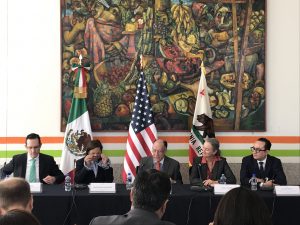 Today began with a breakfast hosted by Mexico’s National Conference of Governors (CONAGO) and Rolando Garcia Martinez, Director General.
Today began with a breakfast hosted by Mexico’s National Conference of Governors (CONAGO) and Rolando Garcia Martinez, Director General.
Lt. Governor Kounalakis spoke at the breakfast about California’s initiatives on trade and investment with Mexico. This was followed by remarks from the outgoing Governor of Baja California, Francisco Vega de Lamadrid, who highlighted the growth in border crossings and economic development.
Then representatives of some of the 31 states spoke: Sonora, which now has its first female governor; Hildago, in the central part of Mexico with a low unemployment rate; Jalisco, with an emphasis on cooperation in the areas of climate change, environment, water and energy; Baja Sur, working on strengthening tourism with 3.6 million visitors last year. I also spoke with the representatives of Guanjanto, with its auto and auto parts production, in addition to supplying 75% of the broccoli supplied to the United States; and Miochan, the home state for 1 million people living in California.
Then the delegation headed to Mexico’s Ministry of Foreign Affairs to meet with Ambassador Mario Chacon to discuss the priorities of the California-Mexico bilateral relationship and cooperation. Ambassador Chacon presented slides and information about the United States and the California-Mexico trade relationship. He indicated support for the United States-Mexico-Canada Agreement (USMCA) and highlighted the 52 free trade agreements Mexico already has in place. He further discussed the border crossings, both commercial and other. He recognized that Mexican migration to the United States has subsided and there now actually is a reverse migration to Mexico. The Ambassador spoke about the many consulates in the United States and the various services they provide. Ambassador Liliána Ferrer Silva, who serves as Consul General in Sacramento, spoke about the good working relationship with the Lt. Governor’s office and what a privilege it is to represent Mexico in the United States.
Day 4: October 4, Final Government Meetings and Departure
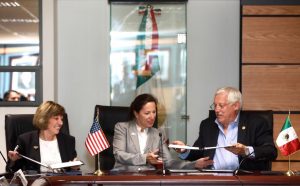 The last day of the mission began with a meeting at Mexico’s Ministry of Economy with Graciela Márquez Colín, Secretary of the Economy, who welcomed the delegation and spoke of shared values. The brief introduction was followed by the signing of an MOU between California and Mexico…
The last day of the mission began with a meeting at Mexico’s Ministry of Economy with Graciela Márquez Colín, Secretary of the Economy, who welcomed the delegation and spoke of shared values. The brief introduction was followed by the signing of an MOU between California and Mexico…
The signing ceremony was followed by a presentation on Mexico’s economic plan from Luz María de la Mora, Undersecretary of Foreign Trade, who said “we are stronger working together.”
Following lunch, the delegation visited the Ministry of Agriculture (SADER) to meet with Agricultural Secretary Victor Villalobos Arambula. Lt. Governor Kounalakis and Secretary Villalobos both spoke, as did Karen Ross, California’s Secretary of the Department of Food and Agriculture. The delegation was joined by Rhiannon Elms, Agricultural Attaché at the U.S. Embassy.
Secretary Ross listed issues of concern and potential future joint efforts, including: organic production, food safety, health issues, climate change adaptation, the circular economy, international trade, capacity building and clean energy/renewable resources. The Secretary went on to discuss future opportunities in agricultural education and leadership.
The group then signed an MOU focused on cross-border agricultural efforts.
For more information or to read the full-length trade mission blog, visit: https://advocacy.calchamber.com/2019-mexico-trade-mission/.
Staff Contact: Susanne T. Stirling

